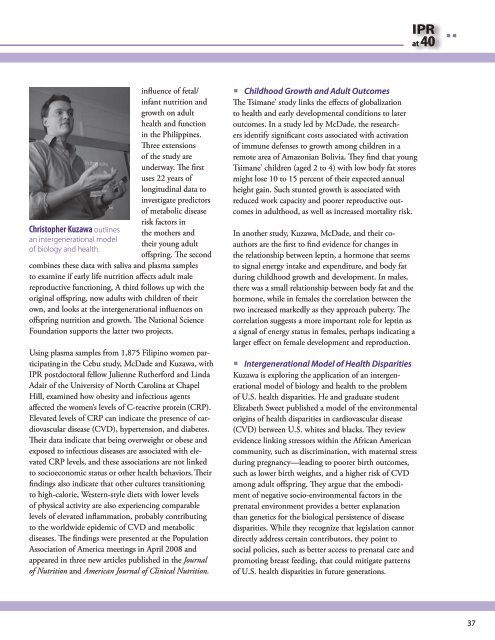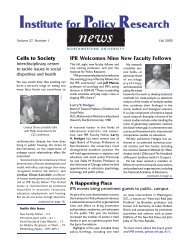IPR - Institute for Policy Research - Northwestern University
IPR - Institute for Policy Research - Northwestern University
IPR - Institute for Policy Research - Northwestern University
Create successful ePaper yourself
Turn your PDF publications into a flip-book with our unique Google optimized e-Paper software.
<strong>IPR</strong><br />
at 40<br />
Christopher Kuzawa outlines<br />
an intergenerational model<br />
of biology and health.<br />
influence of fetal/<br />
infant nutrition and<br />
growth on adult<br />
health and function<br />
in the Philippines.<br />
Three extensions<br />
of the study are<br />
underway. The first<br />
uses 22 years of<br />
longitudinal data to<br />
investigate predictors<br />
of metabolic disease<br />
risk factors in<br />
the mothers and<br />
their young adult<br />
offspring. The second<br />
combines these data with saliva and plasma samples<br />
to examine if early life nutrition affects adult male<br />
reproductive functioning, A third follows up with the<br />
original offspring, now adults with children of their<br />
own, and looks at the intergenerational influences on<br />
offspring nutrition and growth. The National Science<br />
Foundation supports the latter two projects.<br />
Using plasma samples from 1,875 Filipino women participating<br />
in the Cebu study, McDade and Kuzawa, with<br />
<strong>IPR</strong> postdoctoral fellow Julienne Ruther<strong>for</strong>d and Linda<br />
Adair of the <strong>University</strong> of North Carolina at Chapel<br />
Hill, examined how obesity and infectious agents<br />
affected the women’s levels of C-reactive protein (CRP).<br />
Elevated levels of CRP can indicate the presence of cardiovascular<br />
disease (CVD), hypertension, and diabetes.<br />
Their data indicate that being overweight or obese and<br />
exposed to infectious diseases are associated with elevated<br />
CRP levels, and these associations are not linked<br />
to socioeconomic status or other health behaviors. Their<br />
findings also indicate that other cultures transitioning<br />
to high-calorie, Western-style diets with lower levels<br />
of physical activity are also experiencing comparable<br />
levels of elevated inflammation, probably contributing<br />
to the worldwide epidemic of CVD and metabolic<br />
diseases. The findings were presented at the Population<br />
Association of America meetings in April 2008 and<br />
appeared in three new articles published in the Journal<br />
of Nutrition and American Journal of Clinical Nutrition.<br />
< Childhood Growth and Adult Outcomes<br />
The Tsimane’ study links the effects of globalization<br />
to health and early developmental conditions to later<br />
outcomes. In a study led by McDade, the researchers<br />
identify significant costs associated with activation<br />
of immune defenses to growth among children in a<br />
remote area of Amazonian Bolivia. They find that young<br />
Tsimane’ children (aged 2 to 4) with low body fat stores<br />
might lose 10 to 15 percent of their expected annual<br />
height gain. Such stunted growth is associated with<br />
reduced work capacity and poorer reproductive outcomes<br />
in adulthood, as well as increased mortality risk.<br />
In another study, Kuzawa, McDade, and their coauthors<br />
are the first to find evidence <strong>for</strong> changes in<br />
the relationship between leptin, a hormone that seems<br />
to signal energy intake and expenditure, and body fat<br />
during childhood growth and development. In males,<br />
there was a small relationship between body fat and the<br />
hormone, while in females the correlation between the<br />
two increased markedly as they approach puberty. The<br />
correlation suggests a more important role <strong>for</strong> leptin as<br />
a signal of energy status in females, perhaps indicating a<br />
larger effect on female development and reproduction.<br />
< Intergenerational Model of Health Disparities<br />
Kuzawa is exploring the application of an intergenerational<br />
model of biology and health to the problem<br />
of U.S. health disparities. He and graduate student<br />
Elizabeth Sweet published a model of the environmental<br />
origins of health disparities in cardiovascular disease<br />
(CVD) between U.S. whites and blacks. They review<br />
evidence linking stressors within the African American<br />
community, such as discrimination, with maternal stress<br />
during pregnancy—leading to poorer birth outcomes,<br />
such as lower birth weights, and a higher risk of CVD<br />
among adult offspring. They argue that the embodiment<br />
of negative socio-environmental factors in the<br />
prenatal environment provides a better explanation<br />
than genetics <strong>for</strong> the biological persistence of disease<br />
disparities. While they recognize that legislation cannot<br />
directly address certain contributors, they point to<br />
social policies, such as better access to prenatal care and<br />
promoting breast feeding, that could mitigate patterns<br />
of U.S. health disparities in future generations.<br />
37
















